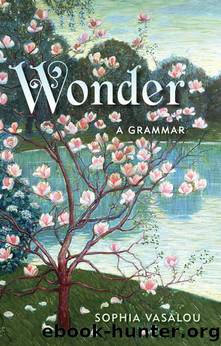Wonder by Vasalou Sophia

Author:Vasalou, Sophia
Language: eng
Format: epub
Publisher: State University of New York Press
Published: 2015-08-14T16:00:00+00:00
Nature here appears to us in the grandeur of its power, a raw vision of might that significantly registers in part as a scene of disorder, in which the order and stability of the natural world as we usually know it stands disrupted. Confronted with nature at its most forceful—though nature at a sufficient remove to pose no real danger to our well-being, enabling us to respond with an aesthetic rather than a visceral fear that would issue in practical actions of avoidance—the contemplator quails. It is the moment of pain, of darkness falling: our ability to put up physical resistance dwindles to nought in our eyes before this scene.
Yet it is not the contemplator as such, we may now discriminate, that quails; it is that aspect of the contemplator that belongs to the domain of nature, whose interests are narrowly determined by his vulnerabilities as an embodied being dependent on nature’s power. In bringing us sharply against the vulnerabilities deriving from our identity as beings belonging to the sensible world of nature, the sublime in fact points us precisely to a realm, and a different derivation of our identity, that lie beyond that—namely, to the domain of the “nonnatural” or “supersensible,” and to our status as rational beings capable of promulgating the moral law and as members of a noumenal realm who are free to submit themselves to that law undetermined by the causal necessity that governs the natural world. In propelling us into that realm, the sublime triggers a powerful moment of joy that marks the transcendence of the domain of nature to a higher domain.
For the striving to perceptually encompass the vast, in the mathematically sublime, might end in debacle; yet the air of defeat should clear once the meaning of our own striving dawns on us. If we strive to encompass the object as a whole, this betrays a possibility and indeed a demand—to intuit an object as a whole, to think the idea of the infinite as a whole—that do not derive from anything we perceive with our senses, and are in fact given to us by the faculty of our reason, that “faculty of the mind that surpasses every measure of the senses.”29 Our very striving to fulfill this demand thus not only points to our possession of this faculty, but also recapitulates the true relationship in which the sensible and supersensible, nature and reason, are ordered in our being—a relationship in which the former subjects itself, or ought to subject itself, to the latter’s dominion.
These same elements are placed in even starker display in the experience of the dynamically sublime. For, faced with nature’s great power, we shrink back in pained awareness of our vulnerability to this power; yet in the very next moment we have discovered in ourselves “a capacity for resistance of quite another kind,” one that “gives us the courage to measure ourselves against the apparent all-powerfulness of nature.” The passage that follows is worth quoting at greater length:
[T]he irresistibility
Download
This site does not store any files on its server. We only index and link to content provided by other sites. Please contact the content providers to delete copyright contents if any and email us, we'll remove relevant links or contents immediately.
The remains of the day by Kazuo Ishiguro(7537)
Tools of Titans by Timothy Ferriss(6930)
The Black Swan by Nassim Nicholas Taleb(6179)
Inner Engineering: A Yogi's Guide to Joy by Sadhguru(5884)
Giovanni's Room by James Baldwin(5868)
The Way of Zen by Alan W. Watts(5785)
The Six Wives Of Henry VIII (WOMEN IN HISTORY) by Fraser Antonia(4784)
The Power of Now: A Guide to Spiritual Enlightenment by Eckhart Tolle(4745)
Astrophysics for People in a Hurry by Neil DeGrasse Tyson(4612)
Asking the Right Questions: A Guide to Critical Thinking by M. Neil Browne & Stuart M. Keeley(4557)
12 Rules for Life by Jordan B. Peterson(3721)
The Ethical Slut by Janet W. Hardy(3491)
Skin in the Game by Nassim Nicholas Taleb(3453)
Housekeeping by Marilynne Robinson(3392)
The Art of Happiness by The Dalai Lama(3375)
Double Down (Diary of a Wimpy Kid Book 11) by Jeff Kinney(3264)
Skin in the Game: Hidden Asymmetries in Daily Life by Nassim Nicholas Taleb(3256)
Walking by Henry David Thoreau(3227)
12 Rules for Life: An Antidote to Chaos by Jordan B. Peterson(3195)
